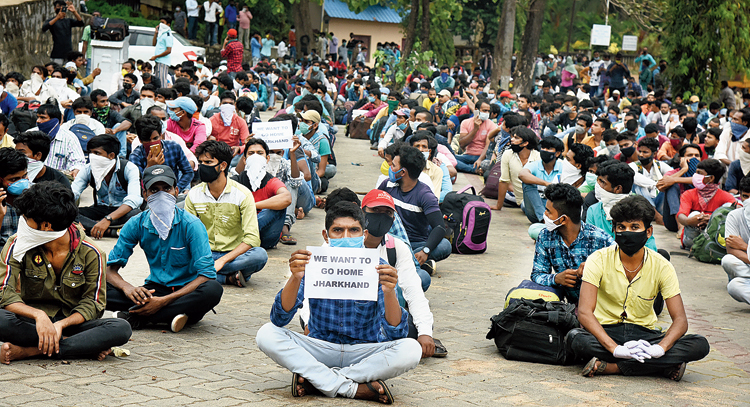Psychiatrists, trade unions and rights activists have cautioned against any effort to force migrant workers to stay back, saying distress during the prolonged lockdown could lead to violence on the streets.
The advice has come against the backdrop of the government asking employees’ unions to encourage workers to resume duties wherever possible. Migrant workers across the country have turned restive and come out onto the streets to protest after being cooped up without any work or income for over 50 days as the fight against the pandemic continues through the lockdown.
There had been widespread outrage and allegations of promoting slavery after the Karnataka government halted the process of sending back migrant workers in trains, following a meeting with a builders’ lobby. The state government has now withdrawn the move, but its fallout persists with over 1,000 migrants staging a protest at Mangalore railway station on Friday.
On Wednesday, Union labour secretary Heeralal Samariya told representatives of labour unions during a videoconference that they should now focus on reviving industry and gradually opening the economy so that there are adequate employment opportunities.
He requested the unions “to instill confidence among the workers to resume work wherever possible”.
A group of academics and rights activists on Friday issued a statement disapproving of measures, if any, not to allow migrants to return home.
The statement was issued by Rajesh Tandon from the NGO PRIA; Sheela Patel from the NGO SPARC, Mumbai; Jagadananda from CYSD, Bhubaneswar; Yogesh Kumar from Samarthan, Bhopal; and Amitabh Kundu from the government think tank Research and Information System.
“We hear reports that some in the business community have advised state governments to keep them (migrant workers) within the state for ‘re-starting’ the economy, post-lockdown. While giving definite offer of jobs and social security is welcome, there can be no logic to detain them against their wishes. Fear, uncertainty, distress and inhuman treatment by local officials and police have resulted in a situation where widespread unrest and violence may occur any time,” the statement said.
The only option, according to the statement, is the central government asking the railways to ferry the migrant workers home in trains from all the major economic centers in an orderly manner, without harassment and stampede.
“The transportation should be organised in a dignified and humane manner, taking special care of pregnant women, small children etc. The state governments can take the responsibility of accepting them following health protocol. The government may consider seeking help from the army in this matter. We appeal to the authorities at the Centre and the states to consider this as a national emergency and act decisively and quickly,” they wrote.
Migrant workers stranded in Mumbai, Pune, Surat, Ahmedabad, Delhi, Hyderabad, Chennai, Lucknow, Indore and other urban centres have been walking hundreds of kilometers on roads, and taking whatever transport is available on the way, to return home. Many have succumbed to fatigue and illness.
“There is widespread confusion among security agencies across states as to what is permissible and what is not. They are asked to produce medical certificates by police, for which they are being fleeced by unscrupulous clinics,” the statement said.
Indian National Trade Union Congress (Intuc) leader Ashok Singh said the home ministry has been issuing revised orders everyday, triggering a lot of confusion on the ground.
“There is not much coordination between the Centre and the states. Everybody is in self-projection mode. And the workers are forgotten. The ideal thing is to allow them to go back. They will come back after some days when they feel more confident,” he said.
The RSS-affiliated Bharatiya Mazdoor Sangh has told the government that the workers should be allowed to return safely.
Psychiatrist Dr Sanjay Gupta, the coordinator of Banaras Hindu University’s Stress Management and Counselling Centre, said those migrants wanting to go back must not be discouraged. The pandemic and the lockdown have created multiple levels of insecurity among migrant workers, he pointed out.
“They have a fear that they may catch the virus. They are also concerned about their families; that something may happen to them. In addition, they are worried about declining or nil income in the last two months. They are uncertain how long this crisis would continue,” Gupta said.
He said the workers should be allowed to travel to their native places.
Dr T.S. Sathyanarayana Rao, honoray secretary of the Indian Psychiatric Society, told The Telegraph that most workers were suffering from stress and depression.
“They may commit greater mistakes under stress. They may be allowed to go back. Those who want to stay may stay,” Rao said.











